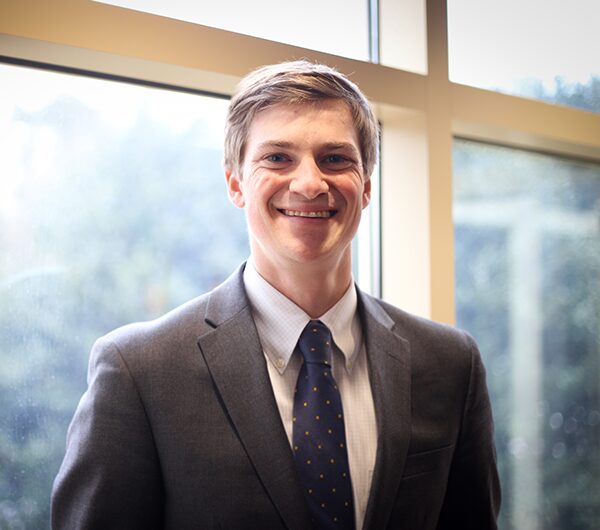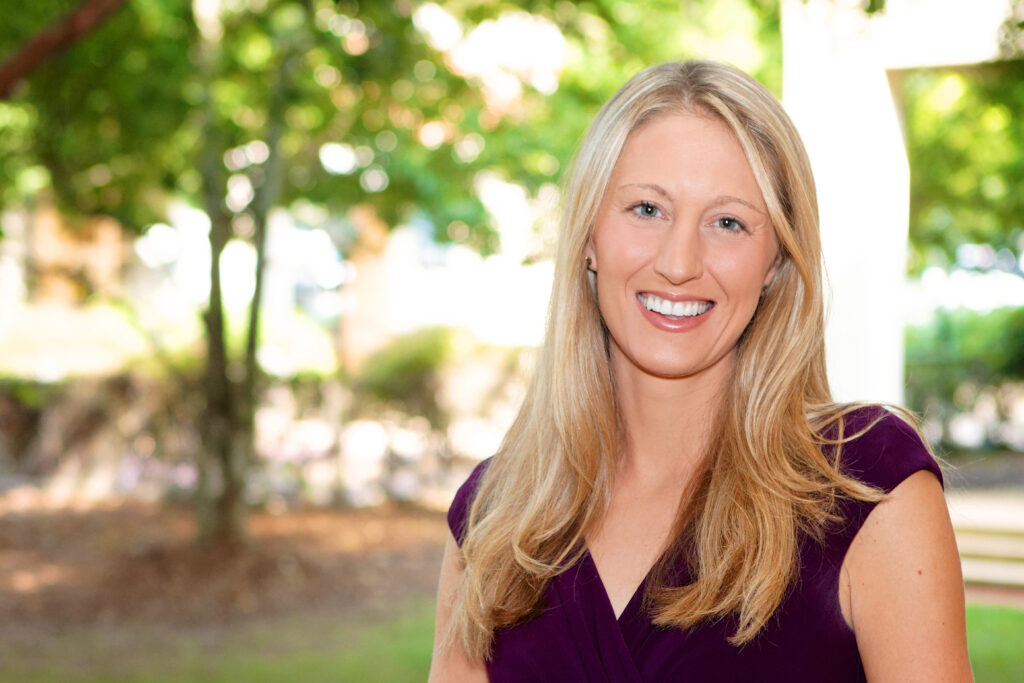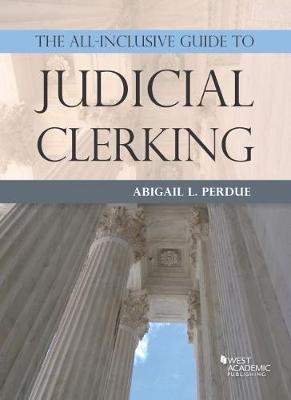DC Summer Judicial Externship
Program Overview
The DC Summer Judicial Externship (DCSJE) Program is an exciting opportunity that places first-year and second-year law students into unpaid summer externships at some of the most vibrant and influential courts in Washington, D.C.
You will spend the summer externing at a participating court in the Washington, D.C., area and attend a weekly experiential course that is tailored to judicial clerking.
Students hear from engaging guest speakers, have lunch with federal judges, and visit historical points of interest. We also pair you with one or more Wake Forest University School of Law alumni living and working in the Washington, D.C., area, who will mentor you throughout the summer.
Externship
You will spend approximately 35 hours per week during the summer externing at a participating court or agency.
As part of your unpaid externship, you will engage in the kinds of intellectually engaging tasks that law clerks perform, such as conducting research on pending cases, observing hearings, and even drafting opinions.
Wake Forest Law students in the DC Summer Judicial Externship Program have externed at the U.S. Court of Appeals for the Federal Circuit, the U.S. District Court for the District of Columbia, the U.S. Court of Appeals for Veterans Claims, the U.S. Court of Federal Claims, the Office of the Special Masters, as well as other courts and agencies.
Apply
Applications accepted on a rolling basis. The earlier you submit your application, the easier it is to find a placement.
Have Questions?
Get answers to the most frequently asked questions.
Giving
Make a gift to the DC Summer Judicial Externship.
Judicial Clerking Course
This is more than an externship. You will also take an experiential course that is tailored to judicial clerking at the participating courts. The course, which is offered virtually or in-person, meets in the evening once per week. It includes an enriching combination of interesting discussion, interactive exercises, and engaging guest speakers.
The course is taught by Professor Abigail Perdue, a former employment law attorney and law clerk at the United States Court of Appeals for the Federal Circuit and the United States Court of Federal Claims. Professor Perdue is also the author of The All-Inclusive Guide to Judicial Clerking, which serves as the course text.
Before the Externship
During the spring semester prior to the externship, you will attend a comprehensive orientation that provides a detailed overview of information you will need to make an excellent first impression in chambers, including chambers confidentiality, judicial ethics, professionalism, and chambers decorum.
You will be provided a comprehensive reading list of key cases and court rules relevant to your court’s jurisdiction which you must complete prior to the beginning of the externship. Professor Perdue prepares the reading list in conjunction with the participating judge or special master for whom you will extern. You will also participate in a research session aimed at effective research strategies for the practice areas of the specific court at which you will extern. This preparation has proven extremely beneficial.
During the Externship
The weekly course will explore the following relevant topics:
- Professionalism
- Courtroom decorum
- Chambers confidentiality
- Judicial ethics
- Docket management
- Bench memo drafting
- Oral argument preparation
- Judicial opinion drafting
Each session will be interactive. You will engage in simulations and complete short writing exercises tailored to the actual work you are doing in chambers.
Throughout the Course
Field Trips
The course also includes several fun and interesting field trips to points of interest from the Library of Congress to the US Supreme Court. For example, students have toured the Supreme Court of the United States, the FBI, Quantico, the US Capitol, and the White House as part of the course.
You will also enjoy informal lunch meetings with federal judges and a federal clerk of the court. You will meet and mingle with federal prosecutors, government attorneys, and attorneys at prominent DC law firms.
Guest Speakers
Guest speakers will occasionally visit the class, including judges, practitioners, government attorneys, and former law clerks. You will spend the summer following a real pending federal case, and take a class field trip to see it argued.
Mentoring and Networking
As part of the course, we pair you with one or more Wake Forest University School of Law alumni living and working in the Washington, DC, area, who will mentor you throughout the summer. In addition, you will have multiple opportunities to network with DC Demon Deacons at happy hours, baseball games, and other events.
Student Experience

“The externship and course components of the DC Summer Judicial Externship helped me expand my career vision and develop the skills necessary to make it happen.“
John Allen Riggins (JD ’18)
About the Program Director
Abigail Perdue, the DC Summer Judicial Externship program director, is a former employment law attorney and law clerk. Professor Perdue is also the author of The All-Inclusive Guide to Judicial Clerking.
In addition to teaching the judicial clerkship course as part of the DC Summer Judicial Externship Program, Professor Perdue also teaches Appellate Advocacy, Introduction to American Law, Diversity and Discrimination, and Legal Writing, Analysis, and Research at Wake Forest Law.

Prior to joining the faculty, Professor Perdue practiced employment law at the New York City office of Proskauer Rose. She went on to clerk for the Honorable Jimmie V. Reyna of the United States Court of Appeals for the Federal Circuit and the Honorable Mary Ellen Coster Williams of the United States Court of Federal Claims. Professor Perdue’s two clerkships were among the most formative experiences in her career, which is why she created the DC Summer Judicial Externship program in 2012, shortly after joining the faculty.
Professor Perdue founded the program so that Wake Forest Law students could also experience the incredible opportunity of working with brilliant jurists and law clerks at some of the most influential courts in America. Professor Perdue lives and works in Washington, DC, for the duration of the program so she can provide on-site assistance to participating judges, special masters, supervising law clerks, and students.
Frequently Asked Questions
Participation, oral and written experiential exercises, and periodic short reflections. Students must attend a weekly class session that will explore, inter alia, professionalism, courtroom decorum, chambers confidentiality, judicial ethics, docket management, bench memo writing, oral argument preparation, and judicial opinion drafting. Among other things, students will participate in interactive classroom sessions and occasionally submit reflective journal entries. Experiential exercises provide students with an opportunity to apply lessons learned in the weekly session to their externship experiences and vice-versa. Students will also be graded on participation in class discussion and attendance at weekly sessions. Students receive six credits, including three credits for the externship and three for the classroom component.
The course grade depends on participation, reflections, and short experiential assignments, such as drafting a bench memo and a judicial opinion. The experiential exercises provide students with an opportunity to apply lessons learned in the weekly session to the externship experience and vice-versa. For example, they include an ethics hypothetical, a bench memo, a list of questions for oral argument, and a judicial opinion. Students occasionally complete short post-exercise reflections considering which strategies worked for each exercise as well as what they might do differently next time.
Students will receive 6 credits, including 3 pass/fail credits for the externship and 3 honors pass/fail credits for the classroom component. The course will satisfy the Law School’s experiential learning requirement.
Yes. Each extern shall maintain a time log detailing the hours he or she works over the course of the externship. In addition, students only receive credit for non-administrative legal work although it is permissible and strongly encouraged that they also be permitted to perform other types of work and projects, including shadowing oral arguments or court hearings or attending staff meetings as these present excellent learning opportunities. Students must complete at least 35 hours of work per week of an externship lasting no less than eight weeks and produce at least 3 pages of original, substantive legal writing per week as part of the externship. (This does not mean that students must produce 3 pages per week. This page limit does not include work product produced as a result of the classroom component.)
Experiential exercises are opportunities for students to apply course lessons to the externship experience and vice versa. These exercises may include an ethics hypothetical, a bench memo, a list of questions for oral argument, and a judicial opinion. Students occasionally complete short post-exercise reflections considering which strategies worked for each exercise as well as what they might do differently next time.
The Program will prepare you to hit the ground running. Prior to commencing the externship, Professor Perdue will provide students with a comprehensive reading list of key cases and court rules relevant to their court’s jurisdiction. During the spring semester prior to the externship, she also hosts an informative orientation session that covers professionalism, ethical issues, confidentiality, etc. Students also attend a research strategies session during the spring semester that provides insight into how to efficiently and effectively research the areas of law addressed.
Yes. Professor Perdue lives and works in Washington, D.C., throughout the Program, and the course is taught on-site at the Wake Washington Center located at One Dupont Circle. Professor Perdue will lead the field trips and be present at the networking events to help you meet and mingle with D.C. Deacons.
Minimal. On-site supervisors have few obligations. We simply ask that they provide students with substantive legal work and other educational opportunities. Supervisors must also meet with externs at least once during the middle of the externship to provide constructive criticism and feedback on performance and again at the end of the externship to provide feedback and tips for successful future performance.
Definitely. We all know that many of the most valuable lessons are learned outside the classroom. Therefore, informative programming regarding related issues, such as Q&A sessions with current or former law clerks and judges, will also be provided throughout the summer along with occasional networking events aimed at allowing Wake students to meet and mingle with current and former law clerks, Wake alumni working in Washington, and other Wake students who are externing in Washington, D.C. Students will also have an opportunity to attend Washington, D.C. alumni receptions and other ABA and law firm networking events. Such programming and social events will provide excellent networking opportunities, which are invaluable to students in this challenging legal climate. D.C. is all about relationships, and the Program will help students build meaningful ones with D.C. Deacons.
The Program is open to first-year and second-year law students earning a J.D. and to rising third-year law students earning a dual degree who are in good academic standing at the law school and who wish to receive academic credit through their participation in a summer judicial externship in Washington, D.C.
No. Students will not receive any compensation for the externship. However, students will receive six hours of course credit.
No. Students arrange and pay for their own housing and transportation, but the Office of Career and Professional Services and Professor Perdue may be able to offer some assistance to students in finding affordable housing. Furthermore, the Wake Washington Center offers affordable student housing in the same building where the class meets in Dupont Circle, which is one of the most popular neighborhoods in D.C. It is also convenient to the courts. Many students have also lived at the GW, American University, and Georgetown Law School dorms, which are also in great neighborhoods. Another resource is WISH housing. In addition, some participating courts provide a metro transit subsidy for externs.
Contact Us
If you have a question that is not answered above, please let us know. You can contact the DC Summer Judicial Externship program director, Professor Abigail Perdue, at dcsje@wfu.edu.
